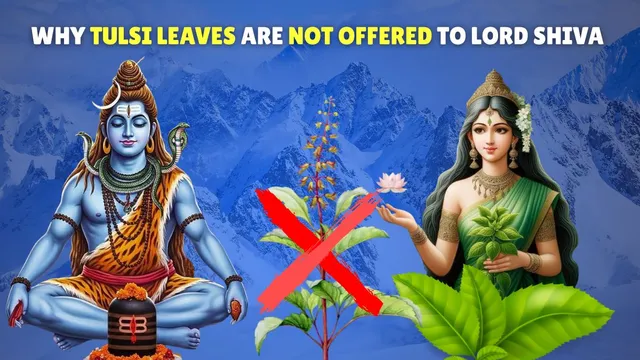- By Kashish Rai
- Fri, 18 Jul 2025 04:50 PM (IST)
- Source:JND
When devotees pray to their deities, they offer various items, seeking blessings and guidance. Among these offerings, Holy Basil or Tulsi holds a revered place for its sacred significance. Tulsi leaves are considered pure and are offered to most Gods and Goddesses, symbolising devotion and purity. However, there are exceptions – Lord Ganesh, Shivling and Goddess Durga as per traditional beliefs. According to the Shiva Purana, Lord Shiva specifically dislikes the offering of Tulsi leaves. This highlights the nuanced nature of Hindu worship, where specific rituals and offerings are tailored to each deity's unique preferences and stories.
Check out the lesser-known legend behind why Tulsi leaves are not offered to Lord Shiva below:
Why Tulsi Leaves Are Not Offered To Lord Shiva? Know Interesting Legend
According to the Puranas, Vrinda, the devoted wife of the demon Jalandhar, protected him with her powerful prayers. Jalandhar's brutality made life hell for the Devis and Devtas, but Vrinda's virtue kept him safe. The Devis and Devtas sought Lord Shiva's help, and he devised a plan with Lord Vishnu. Lord Vishnu disguised himself as Jalandhar, tricking Vrinda into touching his feet, which broke her virtue and left Jalandhar vulnerable. This cunning plan allowed Lord Shiva to defeat the demon, resolving the Devis and Devtas' problem. Vrinda's protection was crucial, but ultimately, her trust was exploited.
ALSO READ: How Are Sawan Shivratri And Mahashivratri Different From Each Other?

Tulsi leaves aren't offered to Lord Shiva due to a legend about his role in Vrinda's husband's death and her curse. (Image Source: Canva)
When Vrinda discovered Lord Vishnu's deception, she was devastated. She cursed him to turn into stone, known as Saligram and was reborn as Holy Basil. Vrinda's transformation came with a condition: she refused to be associated with Lord Shiva, who had killed her husband. This refusal explains why Holy Basil or Tulsi leaves are not offered to Lord Shiva. Instead, Tulsi leaves are essential in the worship of Lord Vishnu, highlighting the complex relationships between deities in Hindu legends. Vrinda's story showcases the consequences of exploiting devotion and the power of a devoted wife's love.
ALSO READ: Why Lord Shiva Wears Tiger Skin? Know Lesser Known Legend And Symbolism
The legend of Vrinda and Jalandhar has lasting implications in Hindu worship. The absence of Tulsi leaves in Shiva's worship and their presence in Vishnu's puja reflect the intricate dynamics between deities. This story highlights the significance of devotion, virtue and the consequences of actions. The narrative also underscores the importance of understanding the nuances of Hindu mythology, where every detail and ritual has a story behind it. By appreciating these stories, devotees can deepen their connection with the divine and respect the traditions that have been passed down.
(Disclaimer: This content includes advice providing generic information only. It is in no way a substitute for qualified spiritual or astrological opinion. Always consult a specialist for more information before adopting any measures.)

